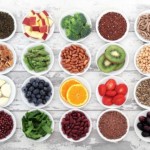HEALTH NEWS YOU CAN USE-Eating Well
By: Dr. Robert Neposlan
In Part One of this article, we shared some information on the idea that diet and specific food choices can lead to inflammation and chronic pain in the  body. We shared a list and guideline of certain foods that have been shown to contribute to inflammation. This week, I’d like to further share some suggestions for reducing inflammation in your body.
body. We shared a list and guideline of certain foods that have been shown to contribute to inflammation. This week, I’d like to further share some suggestions for reducing inflammation in your body.
As we discussed in our previous article, the best thing we can do to improve our health is to make smarter lifestyle and dietary choices. When it comes to inflammation, this means eating a variety of anti-inflammatory foods, limiting or avoiding all together the pro-inflammatory foods (discussed last week), exercising and quitting smoking (if you do).
Anti-inflammatory foods, if eaten regularly, can reduce inflammation in the body and assist in bringing the problem under control. Below is a list of anti-inflammatory foods that if incorporated into your diet on a regular basis will help reduce inflammation. Try and feature some kind of anti-inflammatory food in every meal that you eat. Not only will this benefit you in terms of the pain that you feel but in time will also provide you with a greater ability to control your weight. In addition, as suggested numerous times in earlier articles, 70% of modern disease and conditions that we are dying from in our culture is a product of lifestyle choices. Our modern diet happens to be a big part of that and inflammation happens to be one of its side effects.
Here is a list of some anti-inflammatory foods:
| Vegetables | Fruits | Herbs & Spices | Oils |
| Bell Peppers | Cherries (Acerola) | Basil | Avocado |
| Bok Choy | Apples | Cayenne Peppers | Extra Virgin Olive Oils |
| Broccoli | Avocados | Chili Peppers | Rice Bran Oil |
| Broccoli sprouts | Black Currants | Cinnamon | Grape seed Oil |
| Cabbage | Blueberries | Cloves | Drinks |
| Cauliflower | Fresh Pineapple | Cocoa | Green Tea |
| Chard | Guavas | Licorice | Fish |
| Collards | Kiwifruit | Mint | Cod |
| Fennel Bulb | Kumquats | Oregano | Halibut |
| Garlic | Lemons | Parsley | Herring |
| Green Beans | Limes | Rosemary | Oysters |
| Green Onions/Spring Onions | Mulberries | Thyme | Rainbow trout |
| Kale | Oranges | Turmeric | Salmon |
| Leeks | Papaya | Nuts | Sardines |
| Olives | Raspberries | Almonds | Snapper Fish |
| Spinach | Rhubarb | Flaxseed/linseed | Striped Bass |
| Sweet Potatoes | Strawberries | Hazelnuts | Tuna |
| Turnip Greens | Sunflower Seeds | Walnuts | Whitefish |
As far as supplementation, there are over 15,000 published articles on the benefits of Omega 3 essential fatty acids (stroke, cardiovascular health, brain function, cell communication/function, lower cholesterol, reduce inflammation etc.) We have recommended it for some time now and seen its benefits in reducing inflammation. These, along with probiotics are the two supplements that we recommend for everyone, every day for a lifetime! Research has shown that we ALL require it and we ALL are grossly deficient in terms of how much we are getting from our diets. A great source is pure sourced fish oil. Flax seed, walnuts, and pumpkin seeds are OK sources but will not provide the quantities that the body needs. We cannot overemphasize that supplementation is strongly recommended for everyone. We have excellent sources in our practice available to everyone.
Remember, small changes over time will make great improvements in your health. This is a great place to start.
Until next week,
Eat well
Dr. Rob
